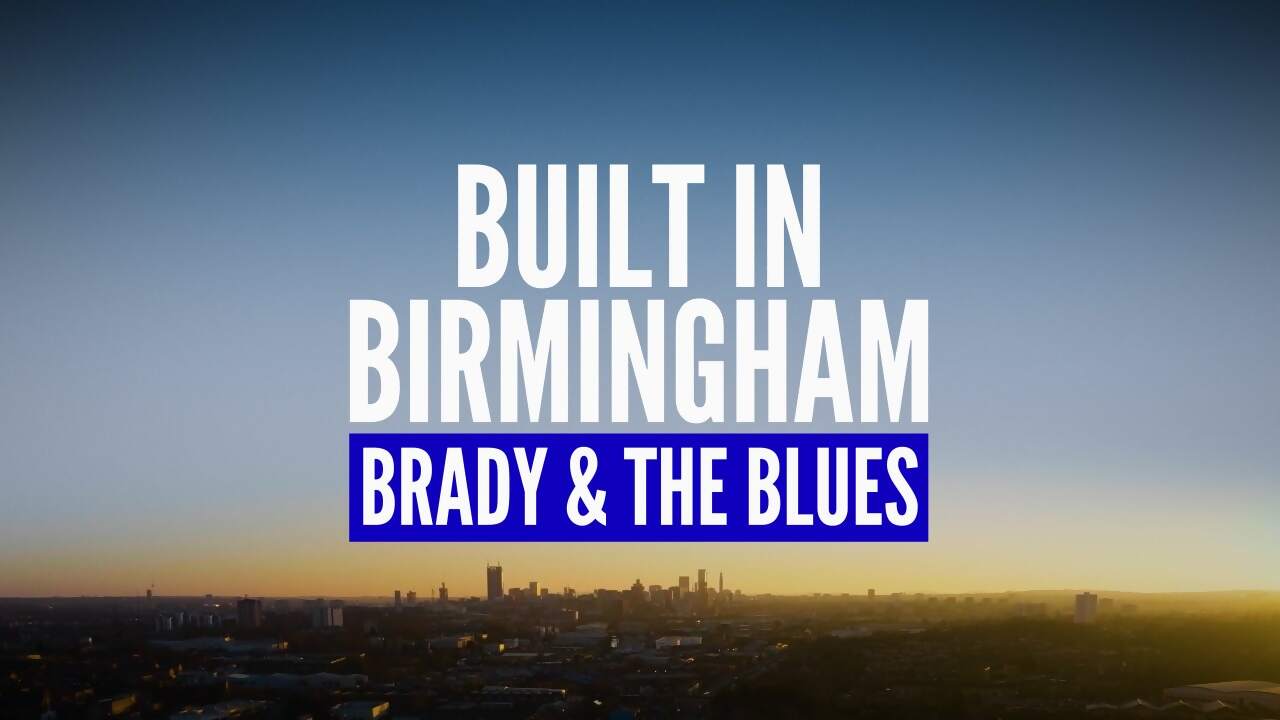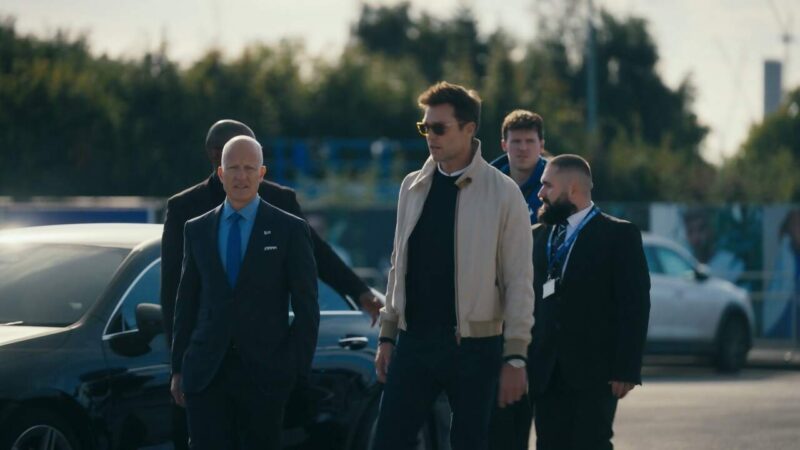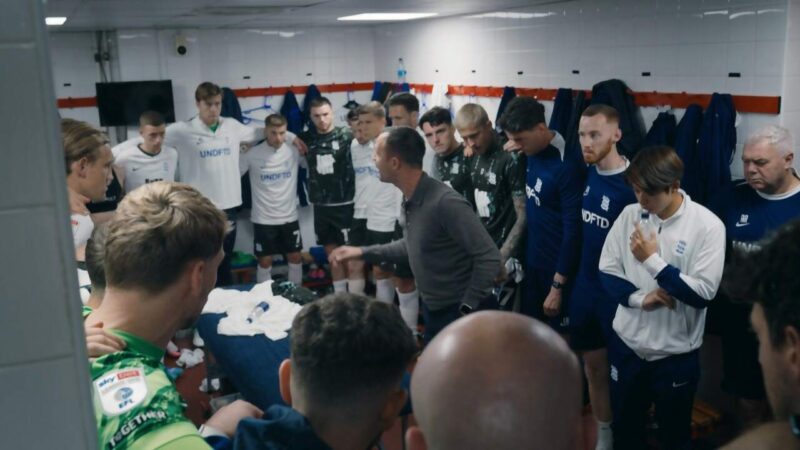
Birmingham City Football Club meet Tom Brady in Prime Video’s Built In Birmingham: Brady & The Blues. Here’s our review.
“Stick that in your documentary, lads,” wrote a Peterborough United fan on social media, in the aftermath of a particularly high-profile match in Birmingham City Football Club’s 2024/2025 season.
That fan? They got their wish, along with a real-time reaction from club top brass. It’s in episode five.
Still, by the time of the match in question, it was a pretty open secret that such a documentary was on the way, and most football followers know the format well by now. Behind the scenes footage, on-camera interviews and a smattering of fan insights. Drop all the episodes, and watch the viewing numbers roll in, all while trying to find an angle that hasn’t been covered by the many rival documentaries (there’s a lot of them) already out there.
The subject this time is Birmingham City, and I have to declare my colours up front: they’ve actually made one of these things about my own team. I’m perfectly au fait with the umpteen disappointments and difficulties of the club, and I was at a good number of the matches on screen across the five episodes here. I declare that, as I’m not likely to be the most impartial reviewer of Built In Birmingham: Brady & The Blues. Approach what follows with caution.
Commercially at least, the high watermark for these programmes has been Welcome To Wrexham, which blends stories of community with the tale of Hollywood money buying up a football club (Wrexham get lots of namechecks, unsurprisingly.) I got the sense of targeting that a little with Built In Birmingham, primarily by the amount it’s willing to play its star card: Tom Brady, a man with appeal far beyond the Bull Ring and the Cornbow Centre down in Halesowen.
Brady, a seven-time Superbowl-winning NFL star (of which we are reminded), is a (very welcome) minority shareholder in Birmingham City, and for international sales reasons – this show is going to around 200 countries on Prime Video – he’s joint billed in the title.
Picking up at the start of the 2023/2024 season, we see an American businessman by the name of Tom Wagner becoming the new owner of the club, and bringing along his friend, Brady, as a stakeholder. There are question marks immediately: is Brady there just for profile, or will he be contributing and involved? The documentary explores that across its five episodes, as we start with a club where confidence is low, the ground is part-condemned (you can see the unsafe seats), and it feels like a minor miracle to not have an owner in prison.

The five episodes are ordered by chronology, but also there are little themed groups within them.
The first episode is a corker. Entitled No Fear, it charts a season where in came new owners, hope was everywhere, and everything went wrong. Nobody is really spared either in telling this part of the story.
Opening with a barb against Birmingham’s city rivals Aston Villa, there’s a fair amount of explaining about the game of football, and introducing of the league system, aimed it seems at American audiences. All fine. The fun – and this repeats across the whole show – is the cast of fans who share their views. The MVP in terms o working in front of the camera for me is Paul Collins, who patiently explains to newcomers the innate Birmingham City tradition of aiming bullets directly into their own feet (although his inclusion gets a mixed response from the club fanbase.)
Mavis and Pat come a close second, not least for their ‘admiration’ of head coach Chris Davies. Lovely to see Sukh Singh getting a good say, too.
It’s interesting who gets the microphone here and who doesn’t, though.
Wagner (who I think I’d have liked more of over the course of the episodes), Brady, Steven Knight and assorted fans get their say, and the language strays occasionally towards the industrial. Mistakes are made, mistakes are owned. That said, I can’t imagine it’s 55 minutes that’ll be enjoyed in the household of Wayne Rooney, who, well, doesn’t come out of it well at all. “I’m a little worried about our head coach’s work ethic,” says Brady. Rooney doesn’t get right to reply. Or if it was offered, he didn’t take it up.
Knight, creator of Peaky Blinders, offers both welcome and historical insights, as well as clips from his show (he’s one of the many listed executive producers). A handful of the players get their moments in the sun across the series too – Alfie May, Jay Stansfield, Ethan Laird, Krystian Bielik – although plenty don’t.
For Birmingham fans, it’s a shame for instance that we don’t hear from Lukas Jutkiewicz or player of the season Christoph Klarer. You do, however, briefly get Troy Deeney’s voice via a small piece of archive, and Simon Jordan on his radio show. Conflict, goes the cliché, is drama.
Still, the challenge that Built In Birmingham: Brady & The Blues faces is twofold.
Firstly, it has to keep looking for huge obstacles, when really, there aren’t that many of them. The documentary notes the weight of expectation on the club as it dropped to League One, and spent unprecedented amounts of money in that division to try and get out. No guarantee of success certainly, and the initial predictions that Birmingham were ‘in for a shock’ aren’t exactly namechecked.
But get into the season proper, and a brief run around Christmas when games weren’t being won is presented as a crisis, when in fact it was more of a ‘we’d better get that sorted out.’
At one stage, Alfie May – a striker introduced as signing with aspirations of Championship football, and sold days before this show was released! – is seen battling a goal drought. But it, like some of the pockets of stories the documentary focuses on, is set up, explained and sorted in minutes.
May, incidentally, really comes across incredibly well.
Further challenges include a potential major injury that isn’t, being one point off the promotion spots, and a sort-of rivalry with former manager John Eustace that I don’t remember as anything of the sort. The filmmakers are searching for dramatic mountains, and instead often have to work with a slightly muddy walk up the Lickey Hills.

If there’s a bigger issue, with critical hat on, then the Tom Brady storyline feels stretched.
As a fan of the team, his involvement is quite something and I’m still staggered it happened. But trying to find angles to weave him into the narrative for five episodes of the show is taxing.
In the first episode or two, when a storied American superstar is nervous about going into a Birmingham pub, it’s nicely set up that a world famous man is slightly wary of a Midlands boozer. By the end though, with Brady’s trips to Birmingham not that frequent, we’re left watching him commentating on the Superbowl thousands of miles away, and Birmingham boss Chris Davies talking about valuable he is, occasionally received a text message. I’m sure he is valuable, but given the title of the documentary, I think it gets quite thin by the time he’s considering giving a 30-minute speech to Cisco, and watching goals on his iPad (Tomoki Iwata’s screamer gets a good airing, Birmingham fans will know.)
The bits that make for better drama? Well, directors Gotham Chopra and Claudia Corbisiero are good at finding the human stuff. In episode three, Joys & Sorrows, striker Jay Stansfield goes to Exeter City, the club where his late father played, and it’s really quite emotional as more of his family are brought into the story.
Elsewhere, we got a glimpse into the family life – and sacrifices – of manager Chris Davies. We also find him not in the best of temper and addressing that. There are, er, ‘occasions’ when the cameras are asked to be turned off. It’s humans, doing their best, often unvarnished.
To its credit too, the documentary doesn’t shy away from the less savoury elements of football support, the hooligan element, and racial discrimination. It doesn’t spend much time on the subject, but it doesn’t ignore it.

Concluding, then.
Built In Birmingham: Brady & The Blues isn’t entirely a warts and all documentary – I think Sunderland Til I Die is the high bar there – but it’s an interesting one, skilfully concocted from cauldron of ingredients that don’t easily mesh.
Inevitably, if its focus had to serve one master rather than two, then there’d be a tighter programme, but also, that’d come at the cost of a narrower audience. Also, proving that you can never rely on Birmingham City to do what you expect, the team itself didn’t throw up too many unexpected dramas, once the first episode was done. Sod’s law. When you want the buggers to lose and make things tighter than they turned out, you can’t even count on them to do that.
It’s all left nicely to continue the story, but for the programme itself to be elevated to the top tier, a closer coming together of the club, the community, and Tom Brady on the same continent feels to my untrained eyes a way forward. The season ahead promises to be a tougher one, and I’d be surprised if the cameras aren’t rolling already.
The five episodes we’ve got though so far? Well, I’m a terrible reviewer of them. I found them absorbing and interesting. There have been Birmingham City documentaries before – I remember one when Karren Brady first ran the club, and then with Barry Fry shouting at people in a dressing room – but this is the most thorough and intriguing.
Much like the team though, there’s still some room for further improvement in the next season. And, much like the team, I’ll be happy to watch more, thank you very much. KRO.








